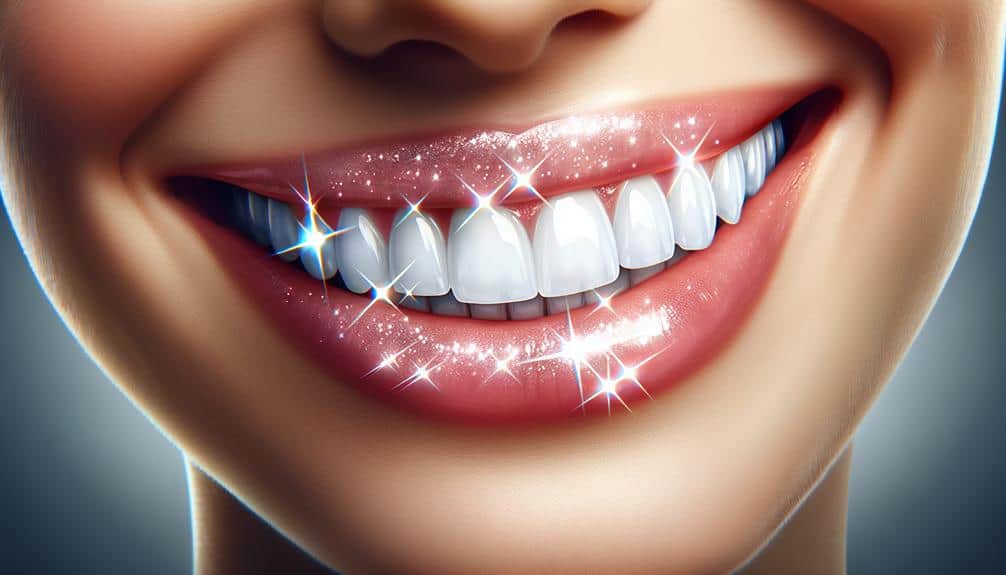Looking to brighten your smile at home? Try oil pulling with coconut or sesame oil to remove bacteria and stains. Mix baking soda with water and lemon juice for a natural toothpaste that you can use 2-3 times a week. Create a turmeric and coconut oil paste to whiten teeth and promote gum health. Consider rinsing with apple cider vinegar for antibacterial benefits, but be aware of potential risks. Another option is an activated charcoal teeth mask to absorb toxins and stains. These DIY methods can help you achieve a radiant, confident grin.
Key Points
- Use oil pulling with coconut or sesame oil for natural teeth whitening and overall mouth health.
- Create a baking soda toothpaste with lemon juice and hydrogen peroxide for cost-effective whitening.
- Make a turmeric and coconut oil paste to brighten teeth and combat harmful bacteria in the mouth.
- Try an apple cider vinegar rinse to naturally whiten teeth and improve gum health, but be cautious of potential risks.
- Use activated charcoal paste or commercial strips to absorb stains and achieve intense whitening results.
Oil Pulling for Teeth Whitening
To whiten your teeth using oil pulling, start by selecting a high-quality oil such as coconut or sesame oil. Oil pulling is an ancient practice known for its oral hygiene benefits. It involves swishing oil around in your mouth to remove bacteria, plaque, and stains from your teeth. This technique not only helps in whitening your teeth but also promotes overall mouth health.
When using oil for oil pulling, make sure you do it first thing in the morning before eating or drinking anything. Take a tablespoon of oil and swish it around in your mouth for about 15-20 minutes. Remember not to swallow the oil as it will contain toxins and bacteria from your mouth. After swishing, spit the oil out into a trash can and rinse your mouth with warm water.
Incorporating oil pulling into your oral hygiene routine can be a beneficial addition. It complements regular brushing and flossing, providing an extra layer of cleanliness for your teeth and gums. Experiment with different oils and find the one that works best for you in achieving a brighter smile.
Baking Soda Toothpaste Recipe
Consider incorporating a homemade toothpaste recipe with baking soda into your oral care routine for a natural teeth-whitening option. Baking soda is a mild abrasive that can help remove surface stains on teeth, revealing a brighter smile over time.
Here is a simple recipe to make your own baking soda toothpaste:
- Baking Soda Base: Mix 2 tablespoons of baking soda with 1 tablespoon of water to form a paste.
- Lemon Juice Scrub: For added whitening benefits, consider adding a few drops of lemon juice to the baking soda paste. Lemon juice contains citric acid, which can help lighten stains.
- Hydrogen Peroxide Solution: To enhance the whitening effect, you can also mix in a small amount of hydrogen peroxide. This ingredient is commonly found in commercial whitening products.
- Brush Gently: Use this homemade toothpaste 2-3 times a week to avoid damaging your enamel. Brush gently for about 2 minutes before rinsing thoroughly.
This baking soda toothpaste recipe offers a natural and cost-effective way to brighten your smile from the comfort of your home.
Turmeric and Coconut Oil Paste
Enhance your teeth-whitening routine with a homemade turmeric and coconut oil paste, known for its natural brightening properties. Turmeric, a vibrant yellow spice, is renowned for its various health benefits, including its anti-inflammatory and antimicrobial properties. When used in dental care, turmeric can help to whiten teeth by gently removing surface stains. Additionally, turmeric is believed to promote gum health and reduce inflammation in the mouth.
Coconut oil, another key ingredient in this paste, is widely recognized for its antibacterial properties and its ability to improve oral health. When combined with turmeric, coconut oil can help to create a paste that not only whitens teeth but also fights harmful bacteria in the mouth.
To make this paste, simply mix turmeric powder with coconut oil to create a smooth consistency. Gently brush the paste onto your teeth and leave it on for a few minutes before rinsing thoroughly. Incorporating this natural remedy into your oral care routine may help to gradually whiten your teeth while promoting overall dental health.
Apple Cider Vinegar Rinse
For an invigorating and natural approach to teeth whitening, try incorporating an apple cider vinegar rinse into your oral care routine. Apple cider vinegar has been praised for its potential benefits for oral health, but it's crucial to be mindful of the risks associated with using it for teeth whitening.
Benefits of Apple Cider Vinegar for Oral Health:
- Natural Antibacterial Properties: Apple cider vinegar can help combat harmful bacteria in the mouth, promoting overall oral health.
- Acidic Nature: The acidity of apple cider vinegar may aid in removing surface stains on teeth, leading to a brighter smile.
- Potential Gum Health Benefits: Some studies suggest that apple cider vinegar could contribute to gum health by reducing inflammation.
- Fresh Breath: The antibacterial properties of apple cider vinegar may help freshen breath by targeting odor-causing bacteria.
Risks of Using Apple Cider Vinegar for Teeth Whitening:
- Enamel Erosion: The acidic nature of apple cider vinegar can potentially erode tooth enamel over time.
- Tooth Sensitivity: Using apple cider vinegar excessively may lead to increased tooth sensitivity.
- Potential Irritation: Some individuals may experience irritation in the mouth or throat when using apple cider vinegar.
- Interference with Dental Work: Apple cider vinegar could interact with dental work, such as braces or dental appliances.
Activated Charcoal Teeth Mask
To effectively whiten your teeth at home, consider incorporating an activated charcoal teeth mask into your oral care routine. Activated charcoal is known for its ability to absorb toxins and stains, making it a popular choice for teeth whitening. To create a charcoal teeth mask, mix a small amount of activated charcoal powder with water to form a paste. Gently brush this paste onto your teeth, ensuring all surfaces are covered. Leave the mask on for about 3-5 minutes before rinsing thoroughly.
Charcoal toothpaste containing activated charcoal is also available commercially for those who prefer a ready-made option. This type of toothpaste can be used daily to help remove surface stains and brighten your smile. Additionally, incorporating charcoal-based teeth whitening strips into your routine can provide a more intense whitening treatment. These strips are typically applied for a short period, following the instructions provided by the manufacturer.
Frequently Asked Questions
Is It Safe to Use These DIY Methods for Teeth Whitening if You Have Sensitive Teeth?
If you have sensitive teeth, managing sensitivity is essential. Protect your enamel by considering alternative whitening options. Sensitivity management and teeth protection go hand in hand. Choose methods that prioritize enamel care to prevent discomfort.
How Often Should These DIY Methods Be Used to See Noticeable Results?
For noticeable results, use DIY methods for teeth whitening consistently. Depending on the method, aim for 2-3 times a week. Results may vary, but you could see improvements within a few weeks. Remember to maintain good oral hygiene for lasting effects.
Are There Any Potential Risks or Side Effects Associated With Using These Natural Whitening Methods?
Like a hidden iceberg, unseen risks may lurk beneath the surface of natural whitening methods. Potential dangers include tooth sensitivity and enamel damage. Proceed cautiously, as the quest for a brighter smile can come at a cost.
Can These DIY Methods Be Used in Conjunction With Professional Whitening Treatments?
Yes, you can combine professional treatments with DIY methods for improved results. This approach may boost efficacy, but it's important to consult with your dentist to guarantee compatibility and avoid potential risks.
How Long Do the Effects of These DIY Whitening Methods Typically Last?
Maintaining the effects of DIY whitening methods varies. Consistent use and good oral hygiene can prolong results. However, long term outcomes depend on individual habits and lifestyle. Remember, "Rome wasn't built in a day."


